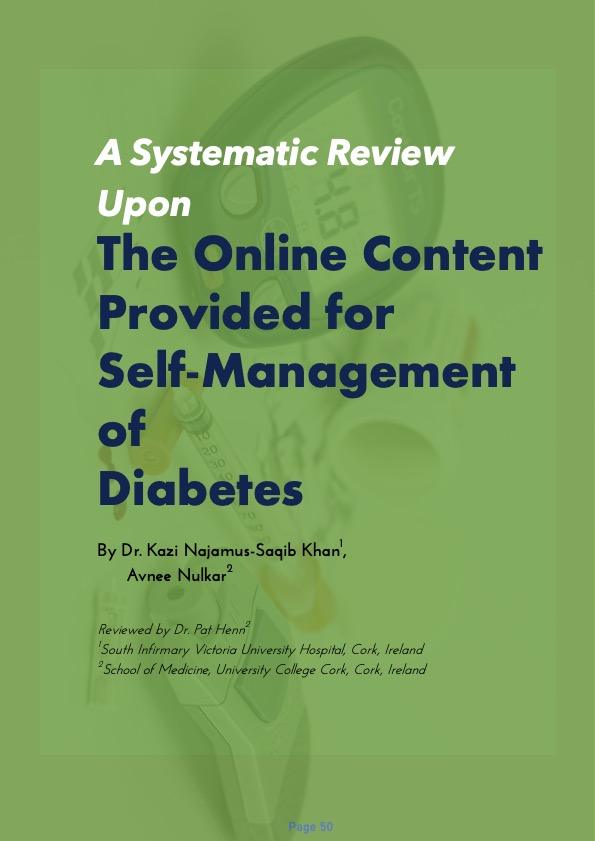A systematic review upon the online content provided for self-management of diabetes
DOI:
https://doi.org/10.33178/SMJ.2019.1.6Keywords:
diabetes, diabetic management, self-management, online contentAbstract
Background: Diabetes is a major illness that requires appropriate education in order to increase one's understanding of self-management. With the advancement of the internet, the proliferation of online health-related content in supporting the management of chronic illness like diabetes has been ongoing; however, little is understood on the sort of acceptable and/or effective information attainable online.
Objective: The aim of this review is to evaluate the current literature in hindsight of online management in diabetes whilst establishing the effectiveness of online management tools, the quality of the online information, and the methods of obtaining online information.
Methods: A series of systematic searches of online databases were conducted in accordance with strictly defined inclusion and exclusion criteria relevant to the research question. Additionally, an evidence-based literature (EBL) checklist tool was used to assess the methodological and reporting quality of each study. Each article was peer-reviewed and screened for any biases.
Results: A result of 11 electronic searches were critically appraised using the EBL appraisal checklist tool and all were found to have overall validity. The results indicate an increase use of online technology to empower an understanding of one's own health. Web-based tools like social media were useful in promoting the management of diabetes but were not able to provide quality information.
Conclusion: Current research indicates the need for more investigation and future development of readily accessible and qualitative information in order to support the self-management of diabetes.
References
Mayo Clinic. (2018). Type 1 diabetes - Symptoms and causes. [online] Available at: https://www.mayoclinic.org/diseases-conditions/type-1- diabetes/symptoms-causes/syc-20353011 [Accessed 25 Jan 2018].
Sattar, H. (2017). Fundamentals of pathology. Chicago,Illinois: Pathoma.com, p.167.
Who.int. (2018). WHO | Diabetes mellitus. [online] Available at: http://www.who.int/mediacentre/factsheets/fs138/en/ [Accessed 25 Jan. 2018].
Almutairi KM. Quality of Diabetes Management in Saudi Arabia: A Review of Existing Barriers. Arch Iran Med. 2015;18(12):816-21
Yu CH, Parsons J, Mamdani M, Lebovic G, Shah BR, Bhattacharyya O, et al. Designing and evaluating a web-based self-management site for patients with type 2 diabetes-systematic website development and study protocol. BMC Med Inform Decis Mak. 2012;12:57.
Pal K, Eastwood SV, Michie S, Farmer A, Barnard ML, Peacock R, et al. Computer-based interventions to improve self-management in adults with type 2 diabetes: a systematic review and meta-analysis. Diabetes Care. 2014;37(6):1759-66.
Balkhi AM, Reid AM, McNamara JP, Geffken GR. The diabetes online community: the importance of forum use in parents of children with type 1 diabetes. Pediatr Diabetes. 2014;15(6):408-15.
Crangle CE, Bradley C, Carlin PF, Esterhay RJ, Harper R, Kearney PM, et al. Soliciting and Responding to Patients' Ques- tions about Diabetes Through Online Sources. Diabetes Technol Ther. 2017;19(3):194-9.
Sayakhot P, Carolan-Olah M, Steele C. Use of a web-based educational intervention to improve knowledge of healthy diet and lifestyle in women with Gestational Diabetes Mellitus compared to standard clinic-based education. BMC Pregnancy Childbirth. 2016;16(1):208.
Sadler MD, Saperstein SL, Carpenter C, Devchand R, Tuncer D, O'Brian C,et al. Community Evaluation of the National Diabetes Education Program's Diabetes HealthSense Website. Diabetes Educ. 2017;43(5):476- 85.
Reininger B, Mecca LP, Stine KM, Schultz K, Ling L, Halpern D. A type 2 diabetes prevention website for african americans, Caucasians, and mexican americans: formative evaluation. JMIR Res Protoc. 2013;2(2):e24.
Magnezi R, Bergman YS, Grosberg D. Online activity and participation in treatment affects the perceived efficacy of social health networks among patients with chronic illness. J Med Internet Res. 2014;16(1):e12.
Litchman ML, Rothwell E, Edelman LS. The diabetes online community: Older adults supporting self-care through peer health. Patient Educ Couns. 2017.
Fergie G, Hilton S, Hunt K. Young adults' experiences of seeking online information about diabetes and mental health in the age of social media. Health Expect. 2016;19(6):1324-35.
Yu CH, Parsons JA, Hall S, Newton D, Jovicic A, Lottridge D, et al. User centered design of a web-based self-management site for individuals with type 2 diabetes - providing a sense of control and community. BMC Med Inform Decis Mak. 2014;14:60.
Tang PC, Overhage JM, Chan AS, Brown NL, Aghighi B, Entwistle MP, et al. Online disease management of diabetes: engaging and motivating patients online with enhanced resources diabetes (EMPOWER-D), a randomized controlled trial. J Am Med Inform Assoc. 2013;20(3):526-34.
Seljan S, Baretic M, Kucis V. Information retrieval and terminology extraction in online resources for patients with diabetes. Coll Antropol. 2014;38(2):705- 10.

Downloads
Published
License
Copyright (c) 2024 Kazi Najamus-Saqib Khan, Avnee Nulkar

This work is licensed under a Creative Commons Attribution-NonCommercial 4.0 International License.









